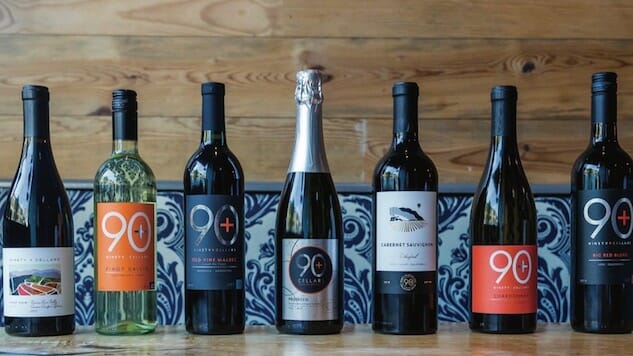90+ Cellars Makes Good Wine Affordable
Photo via 90+ Cellars
Unless you’re a serious oenophile, the wine you buy is typically dictated by price. We all want to drink a $50 bottle of Italian Barolo, but more often than not, we settle for a perfectly respectable $13 Pinot Noir. Boston-based 90+ Cellars is looking to change that.
It all started in the spring of 2009 when Kevin Mehra grabbed a handful of issues of Wine Spectator and listed out the independently-owned vineyards with wine that rated above 90 points. His plan: to contact the wine-makers and see if they’d be open to selling some of their wine to him in bulk, so he could rebottle and sell them at a discount under his own label.
The timing proved serendipitous. It was the peak of the recession, and wine sales—especially in the States—had cratered, leaving wine producers with a vast overstock of bottles that were more than $20, and a tricky predicament: either sell the wine off at a steep discount, effectively eroding the high-cost brand credibility they had built, or retain that prestige and let the excess wine turn to vinegar.
Mehra said about half of the vineyards responded to his cold-call inquiries, and about 30% sent him samples. Since the initial release, the brand has grown exponentially, offering bottles under their 90+ Cellar line as well as the Magic Door and Iron Sides labels; the former offers super-premium, small-production wines from places like Champagne and Oakville in the Napa Valley, while the latter brand lets his wine experts craft custom blends from California reds. Bottles from these brands range from $12 to $45, about $10 to $15 cheaper than the same wine from the actual vineyards. 90+ Cellars also produce Lila Wines, cans of sparkling rose from France and Vino Frizzante and Pinont Grigio from Italy. And Mehra’s team have also branched into creating their own product with their Mija Sangria, a bottled Spanish-style punch crafted in New York City, made from 100% unfiltered fruit juice that’s heat-pasteurized to retain the pulp and thus deliver more flavor that filtered versions.
“People like to think that wine is a really romantic business,” Mehra says. “But it’s a big business, much like the soda industry. An independent is going up against big national brands—three distributors control 65% of the market. Retailers have consolidated, and small family wineries can’t find the shelf space.”
90+ Cellars offers those vineyards a lifeline to continue to produce their top-shelf bottles without worrying about what to do with the excess. And, in the process, Mehra can offer high-quality wine at a more approachable price point.
-

-

-

-

-

-

-

-

-

-

-

-

-

-

-

-

-

-

-

-

-

-

-

-

-

-

-

-

-

-

-

-

-

-

-

-

-

-

-

-








































